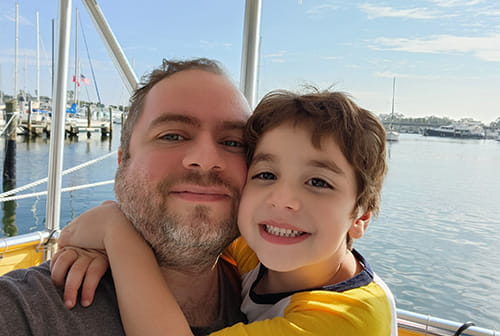Understanding the Sources of Heath Inequities with the Hope to Improve the Lives within Our Community
February 16, 2023
UH Research & Education Update | Qtr 1 2023
By Sadeer Al-Kindi, MD and UH R&E Team
Growing up in a family of engineers in Baghdad, Iraq, Sadeer Al-Kindi, MD knew he wanted to become a cardiologist because of the loss of several family members to cardiovascular events at relatively young ages. Following high school, Dr. Al-Kindi moved to Education City, Qatar, where he received his medical degree with academic distinction and honors from Weill Cornell School of Medicine – Qatar. It was evident to him how the difference in the socio-economic status of the two cities could significantly influence a community's overall health. The observations and questions continue to grow as he settled in at University Hospitals Cleveland Medical Center for residency and fellowship training.
The Value of Mentors
After cardiovascular medicine fellowship, Dr. Al-Kindi began to lead various clinical research projects and soon became the co-director of the CINEMA Program and Director of the Cardiovascular Phenomics Core. Dr. Al-Kindi credits his successful career advancement to the various mentors and is incredibly proud of the work he and his colleagues have accomplished with the guidance of these individuals.
Dr. Al-Kindi acknowledges that many people have changed his career. Dr. Keith Armitage recruited him to UH. Dr. Sanjay Rajagopalan has been a very close mentor and friend who had a major impact on his career and training. He had the privilege of working with Dr. Guilherme Oliveria, who guided him throughout the early days of clinical and research training at UH. Dr. David Zidar, who he worked/is working closely with, provided him with different perspective on translational research and trained him in population immunology. Dr. Al-Kindi is thankful for many others who have positively impacted his career trajectory.
Socio-Economic and Environmental Factors Increase Risk of Cardiovascular Disease
Research was embedded in Dr. Al-Kindi's upbringing. "I've always been interested in research. My parents are engineering researchers. I grew up hearing about research and learning about all the studies my dad worked on with his students."
Dr. Al-Kindi and his colleagues focus their research to understand the sources of health inequities with the hope to improve the lives within our community. Health inequities are often overlooked and not being discussed in medical training, especially concerning cardiovascular disease.
Growing up in a war-torn country and then moving to one of the wealthiest countries in the world, Dr. Al-Kindi had first-hand experience and knowledge of seeing how poverty or the abundance of resources highlight the stark differences in lifestyles and how much it impacts health care. “It makes me pause and think about the larger picture of health and equity. Community, green space, income, poverty, access to healthy foods, and transportation all affect our health. No matter what medical interventions are given, if a patient cannot afford the medicine or a device, the interventions are meaningless. These challenges help Dr. Al-Kindi formulate his research questions and allow him to engage with the community to understand how to improve health equity.
Dr. Al-Kindi's latest publication in Nature Review explained how climate change is the greatest empirical challenge to planetary and human health, and a collaborative approach is desperately needed to solve the crisis.
"We are impacted by everything around us, our neighborhood, the air we breathe, the availability of green space, the parks, and what we cook with are just a few examples of what influences our health. Physicians don't think about these factors all the time because we're trained to focus mainly on vital signs and lab work. We need to start thinking outside the box and try to emphasize the impact of air pollution, air quality, and water quality has on our health, specifically our heart health."
As for the next step, Dr. Al-Kindi is developing a new project where he can improve and clean the air for individuals in the impoverished communities. The project aims to identify individuals with a high risk for heart disease and provide them with portable clean air purifiers. The study seeks to understand whether various health conditions can be improved for individuals in a socially deprived community if the proper tools and resources are provided to them. "This is only one study; there are other ways we can make a difference: improving the awareness and advocacy efforts and the relationship with our local health departments. These efforts align with the University Hospitals' mission to teach, heal, and discover."
Impacting Health in the Long-term
It is essential to understand the reasons for non-adherence so individuals can be empowered to change and be educated on the benefits of the interventions. It is a multi-level intervention; whether it's medical, social, or behavioral interventions, it's a pyramid, and you must start building from the bottom up. "If we can provide the resources and understand the health impacts within the real-world setting, we can move to the implementation science or completion research phase. To understand the barriers to utilization, we have to start with something that's efficacious and works."
Implementing the research findings is one of Dr. Al-Kindi's goals for the future. "I would love to develop and apply something helpful for fighting environmental health risks. Then, not only publish a paper on the development but know that whatever it is, it truly works and can be offered to individuals who actually need it. Whether providing portable air cleaners or planting trees in the neighborhood, the goal is to transform health in the long term."

FIVE IN FIVE with Dr. Al-Kindi:
- If you can have dinner with anyone, who would it be? With my wife.
- What is your favorite TV series? Breaking Bad.
- How would your colleagues describe you in 3 words? Intellectually curious, collaborative, supportive.
- Where is your favorite place to eat in Cleveland? Ferris Shawarma.
- Would you rather be able to read people’s minds or teleport? Read peoples’ minds for sure!
Tags: Research, Physician Recognition


